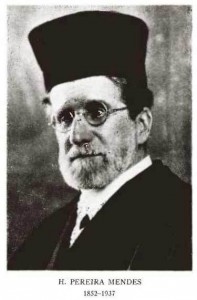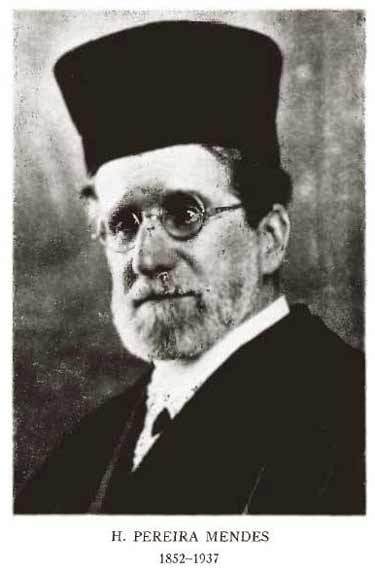 (All quotes are from the article “Henry Pereira Mendes” by David De Sola Pool, American Jewish Year Book Vol. 40 (1938-1939), pages 41-60, available at www.ajcarchives.org/main.php?GroupingId=10072.)
(All quotes are from the article “Henry Pereira Mendes” by David De Sola Pool, American Jewish Year Book Vol. 40 (1938-1939), pages 41-60, available at www.ajcarchives.org/main.php?GroupingId=10072.)
In last month’s column we traced the early career of Reverend Dr. Henry (Chaim) Pereira Mendes and described his extraordinary service to Congregation Shearith Israel in New York where he served as hazan (chazzan) and minister from 1877 to 1923 and then as minister emeritus from 1924 until his passing in 1937.
However, “besides carrying out his exacting duties as hazan, preacher and teacher, and as superintendent of the Polonies Talmud Torah School, Dr. Mendes always found time to work for every Jewish cause. We recall him frequently intervening with city authorities to prevent the introduction of sectarian exercises into public schools. We find him organizing Jewish schools and societies to counteract the excessive ardor of those missionaries who did not scruple to lure Jewish children away from their parents. We meet him safeguarding the religious interests of Jewish patients in city and state institutions. We see him active in having examination dates in colleges and universities set on some day other than a Jewish holy day. He intervenes with the Government or with local authorities to obtain furloughs for Jewish soldiers and civil servants on the Jewish festivals and holy days. He is a prime mover in organizing and furthering the work of the Jewish Sabbath Observance Society of which he served as vice-president.”
Dr. Mendes was involved in a plethora of activities on behalf of the greater American Jewish community. He addressed a hearing in Washington to protest restrictive immigrations laws. He went to Albany, New York, to speak against Sunday laws that discriminated against Sabbath observers and vigilantly monitored activities that would have outlawed shechita.
He upheld “the good name of the Jew in the secular press to which he frequently contributed vigorous letters, striking in their forthright assertion of Jewish idealism. He conducted a class for the newly organized Young Men’s Hebrew Association in the second season of its existence, 1877-1878, and thereafter, during all the years of his life, we find him constantly lecturing and speaking from innumerable platforms, Jewish and non-Jewish, always with dignity and an earnest sense of the responsibility of his function as a minister of God, voicing the highest ideals of Judaism.”
He became involved in the activities of the New York Jewish community almost from the moment of his arrival in the United States and was involved in the creation of a number of the city’s most notable Jewish organizations.
“Thus, the birth of the Montefiore Hospital is due to the fact that, early in 1884, at the instance of Dr. Mendes, representatives of the synagogues of the city were called together to plan a fitting celebration of Sir Moses Montefiore’s forthcoming hundredth birthday. Out of that meeting and subsequent meetings held in the rooms of the Congregation Shearith Israel, the Montefiore Home for Chronic Invalids, now the Montefiore Hospital, came into being.”
After learning there were deaf-mute Jewish children attending New York City’s public schools, Dr. Mendes insisted that officials conduct a survey to see how many such children there actually were. Their numbers were much higher than expected, and this led him to found a society called The Horeb Home and School for Jewish Deaf-Mutes. He raised funds to enable the society to open a school for these children and then raised additional funds for a school building. The school, whose student population reached 250, became one of the leading schools for the handicapped in America. He made sure that it was run according to halacha, with Sabbath observance and kashrus strictly observed and with religious training for the students.
Dr. Mendes collected funds that were used to assist the victims of flood, earthquake and other disasters. He often visited the sick and suffering.
“His office adjoining the Synagogue (was) busy from morning to night with callers of every description – distinguished citizens inviting his cooperation in some important movement; a Sabbath observer for whom he finds employment; a rabbi or Hebrew teacher seeking a position; a lonely old person for whom he procures admission into a home for the aged; a family whom he unites after an estrangement; a widow to be cared for; a troubled soul looking for counsel and solace; a poor distracted applicant for aid…. Indeed, on March 5, 1892, Dr. Mendes, taking up his humanitarian work the moment (the) Sabbath was over, almost gave his life, falling at the door of his home severely wounded by a bullet fired at him by a poor wretch demented from misery.”
As a result of Dr, Mendes’s influence the Jews of Havana, Cuba were granted the right to purchase a burial ground. Given that he became the recognized spiritual leader of Sephardic Jewry in the Western hemisphere, he was able, through correspondence and personal influence, to further the cause of Judaism in Panama, Costa Rica and other countries in Central and South America.
“Outside of the Jewish community, Dr. Mendes was no less active. His reputation grew from year to year. As early as January 24, 1878, he was a speaker at the third anniversary meeting of the Society for the Prevention of Cruelty to Children, together with Joseph H. Choate, Felix Adler, Chauncy M. Depew, General Horace Porter and the Rev. Henry C. Potter. On April 24, 1888, he opened the session of the United States Senate with (a) prayer.
“He was appointed a member of the Mayor’s Committee on the Hudson-Fulton celebration in 1909, and opened the ceremonies with prayer at the Metropolitan Opera House. He was a member of the Committee of Fourteen for the suppression of the abuses in connection with the Raines Law Hotels. He was a frequent and eloquent pleader for the cause of international arbitration and world peace, and he wrote innumerable articles and open letters on this theme of human brotherhood and international peace, stressing his claim that the spirit of the teaching of the Bible demands compulsory arbitration.
“In Masonry, he was chaplain of the Albion Lodge No. 26, F. and A. M., and he was the first Jew to attain the honor of being grand chaplain of the Grand Lodge of the State of New York (1895, 1897). As a member of the Clergy Club and as an active worker in every worthy public cause, he earned the high esteem of his colleagues in the Christian ministry and of leading citizens of all parties and all faiths.”
While the above is by no means exhaustive, the reader can certainly see that here was a man who was involved in an unbelievable number of activities that benefited his fellow man – Jew and non-Jew alike.
Early Zionist
“He was one of the first Zionists in the United States in the days when Zionism was still unpopular and misunderstood. Theodor Herzl asked his cooperation in organizing the movement in the United States, and he was elected vice-president of the Federation of American Zionists and a member of the Actions Committee of the World Zionist Organization at the Second Zionist Congress in Vienna in 1898, and again in Basel in 1899. All his life he remained an eloquent, albeit at times the sole, exponent of what he called ‘Bible Zionism’ or ‘Spiritual Zionism.’ On his deathbed, with the threat of further partition menacing the Land of Israel, he whispered, ‘Palestine without Jerusalem is unthinkable.’”
About the Author: Dr. Yitzchok Levine served as a professor in the Department of Mathematical Sciences at Stevens Institute of Technology, Hoboken, New Jersey before retiring in 2008. He now teaches as an adjunct at Stevens. Glimpses Into American Jewish History appears the first week of each month. Dr. Levine can be contacted at llevine@stevens.edu
.
The words of this author reflect his/her own opinions and do not necessarily represent the official position of the Orthodox Union.

